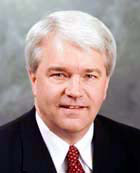By claiming far-reaching and unprecedented executive privilege in its power struggles with the U.S. Congress, the Bush White House has roiled the political waters, forcing both Democrats and Republicans to weigh near-term political consequences of their response against a real and tangible threat to the long-term constitutional powers of Congress, suggests a congressional expert from Washington University in St. Louis.

“The White House is articulating the strongest position on executive privilege ever taken by a president, ” says Steven S. Smith, the Kate M. Gregg Professor of Social Sciences in Arts & Sciences.
“The claim of executive privilege is reaching far beyond communications with the president and beyond current public office holders. Word from the White House that the Justice Department would not be allowed to prosecute a contempt of Congress citation in cases involving executive privilege represents a direct challenge to Congress’s institutional power. Some very messy constitutional issues are likely to end up in the courts in the next 12 months.”
Smith, the author of six books on congressional politics, says the White House’s unprecedented claims of expanded executive privilege powers is an attempt to focus the political spotlight on the workings of Congress, causing potential problems for both Republicans and Democrats.
“The president has made Congress the issue,” Smith says. “The Democrats’ inability to get some of their own legislative priorities — such as ethics reform — enacted, is hurting them. They risk becoming a Congress that investigates but does not legislate. Republican obstructionism in the Senate has played a role in slowing legislative action, but the Republican charges will gain more traction as time passes. While the president is unpopular and the issue of the U.S attorneys’ firing works against the Republicans, Democratic leaders may soon face a serious public relations challenge.”
Nevertheless, conflict between Congress and the president is escalating on several fronts, sometimes with the participation of Republicans on Capitol Hill, Smith notes.
“Republican Senator Arlen Specter appears to be supporting Judiciary Chairman Patrick Leahy’s approach to investigating Attorney General Alberto Gonzalez’s role in approving intelligence operations and in the firing of U.S. attorneys. While not always publicly joining Leahy, Specter is not standing in the way and often strikes out on his own, as he did yesterday in demanding a White House briefing on intelligence operations mentioned by Gonzalez.
“The subpoenas of Karl Rove and R. Scott Jennings, presidential political advisors, concern the suspicion that political considerations, not merit, drove the firing of the U.S. attorneys. Specter even mentioned strategies for circumventing the Justice Department in prosecuting contempt citations — specifically the appointment of a special prosecutor or using Congress’s inherent contempt power by conducting a trial of its own. Specter’s quiet but obvious participation in the process may signal the White House that removing Gonzalez from his post is their best move. In both houses, Republicans seemed poised to support a range of appropriations and authorizations bills that the president is threatening to veto.
“Many Republicans will not want to enter an election year having voted for continuation of the president’s policy in Iraq and against popular domestic spending. Agriculture, education, environmental, and other programs will present difficulties for Republicans and the White House,” he concludes.
Editor’s note: Smith is available for phone, e-mail and broadcast interviews. Washington University has VYVX and ISDN lines available free for news interviews.